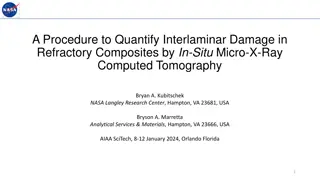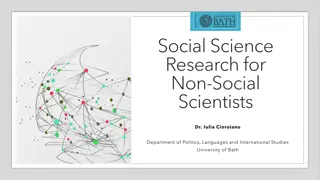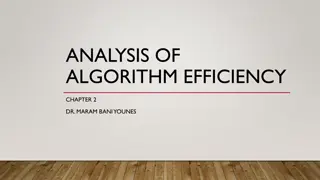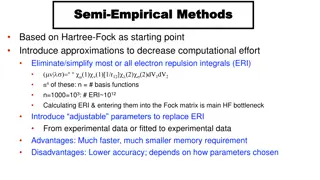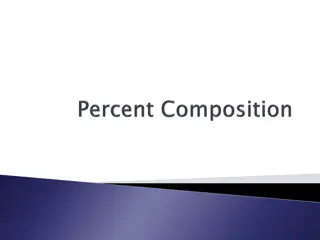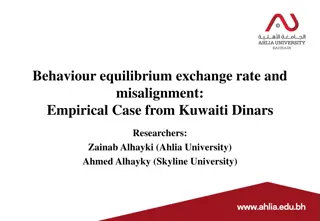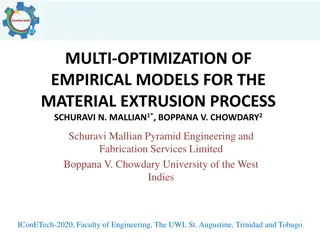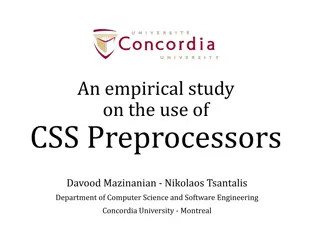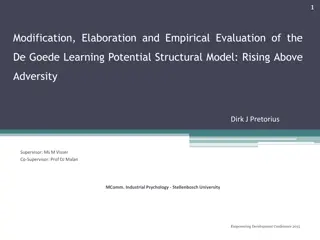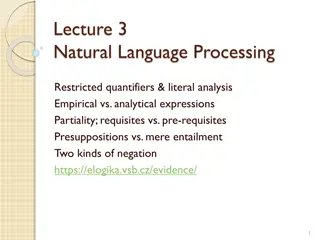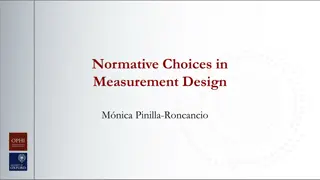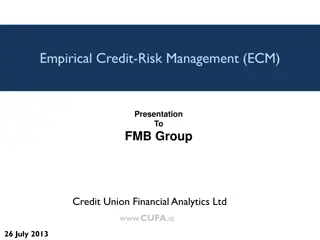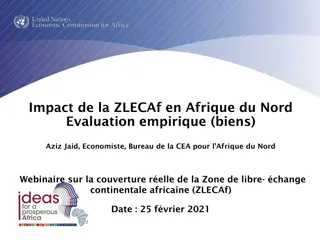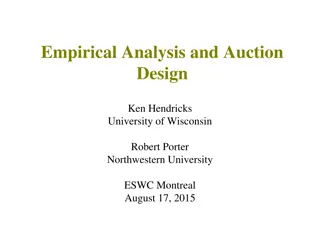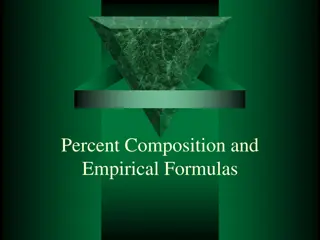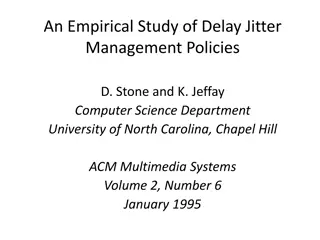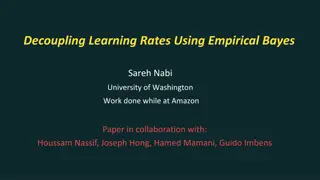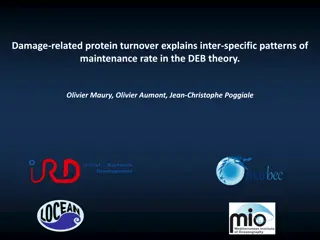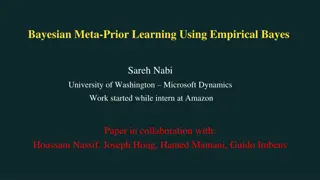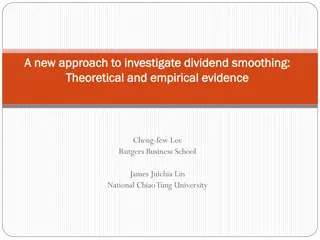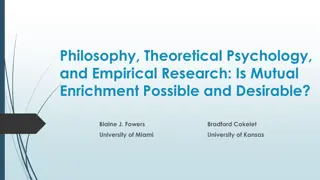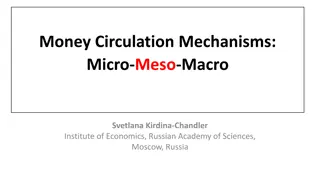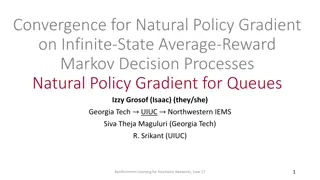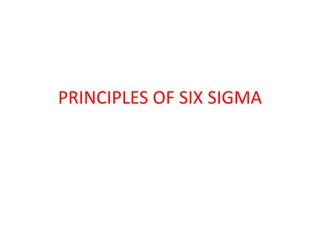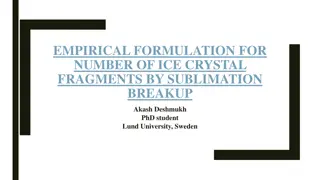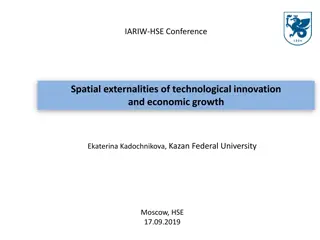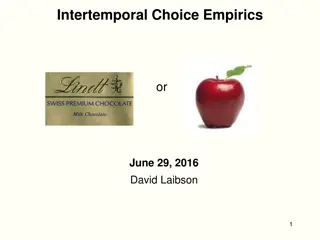Procedure for Quantifying Interlaminar Damage in Refractory Composites Using Micro-X-Ray CT
This study presents a method to quantify interlaminar damage in refractory composites through in-situ micro-X-ray computed tomography. The procedure aims to capture the progressive failure in ASTM-sized specimens, providing empirical data for improving simulations of composite materials. Various spe
6 views • 19 slides
Understanding Social Science Research for Non-Social Scientists at University of Bath
This resource delves into social science research fundamentals, encompassing types of inquiry, empirical research categories, primary and secondary research distinctions, and the importance of selecting a suitable research topic. It offers guidance on initiating research based on empirical observati
1 views • 10 slides
Understanding Algorithm Efficiency Analysis
In this chapter, Dr. Maram Bani Younes delves into the analysis of algorithm efficiency, focusing on aspects such as order of growth, best case scenarios, and empirical analysis of time efficiency. The dimensions of generality, simplicity, time efficiency, and space efficiency are explored, with a d
1 views • 28 slides
Overview of Semi-Empirical Methods Based on Hartree-Fock
Semi-empirical methods derived from Hartree-Fock theory aim to reduce computational effort by approximating or eliminating electron repulsion integrals. Strategies include introducing adjustable parameters to replace ERI calculations and utilizing zero differential overlap methods like CNDO, INDO, N
1 views • 11 slides
Institutionalism and Methodological Issues in Political Science
Institutionalism is a foundational concept in political science, emphasizing the study of governing institutions and their role in shaping political behavior. It explores inductive and deductive approaches to research, highlighting the significance of empirical evidence and theoretical assumptions.
0 views • 19 slides
Parallel Implementation of Multivariate Empirical Mode Decomposition on GPU
Empirical Mode Decomposition (EMD) is a signal processing technique used for separating different oscillation modes in a time series signal. This paper explores the parallel implementation of Multivariate Empirical Mode Decomposition (MEMD) on GPU, discussing numerical steps, implementation details,
1 views • 15 slides
Understanding Percent Composition and Empirical Formulas in Chemistry
The Law of Definite Proportions governs the composition of compounds based on molar masses, allowing us to calculate percentage compositions of elements within a compound. Through examples involving various compounds like Fe3C, sulfur dioxide, ammonium nitrate, glucose, and acetic acid, we explore t
3 views • 7 slides
Enhancing Learning Through Classroom Discussions
Classroom discussions play a vital role in improving students' conceptual understanding, communication skills, and thinking processes. By engaging students in active discourse, teachers can foster an environment that encourages critical thinking, idea expression, and effective communication. The fiv
1 views • 19 slides
Understanding Therapeutic Drug Monitoring and Clinical Pharmacokinetic Parameters
Therapeutic Drug Monitoring (TDM) utilizes pharmacokinetic principles to optimize drug therapy by balancing efficacy and toxicity levels. Historical background reveals a shift from empirical dosing to precise pharmacokinetic analysis, aiming to minimize toxicity risks and maximize therapeutic benefi
0 views • 47 slides
Empirical Research on Surrogacy in New Zealand: Key Findings
Associate Professor Debra Wilson from the University of Canterbury in New Zealand conducted empirical research on public opinions regarding surrogacy. The findings revealed three surprising results, including perspectives on surrogates being compensated, the importance of genetics in surrogacy arran
0 views • 11 slides
Generalization of Empirical Risk Minimization in Stochastic Convex Optimization by Vitaly Feldman
This study delves into the generalization of Empirical Risk Minimization (ERM) in stochastic convex optimization, focusing on minimizing true objective functions while considering generalization errors. It explores the application of ERM in machine learning and statistics, particularly in supervised
0 views • 11 slides
Empirical Analysis of Kuwaiti Dinar Exchange Rate Behavior and Misalignment
This research focuses on studying the behavior of the real equilibrium exchange rate (REER) of Kuwaiti Dinars, estimating the equilibrium exchange rate using the BEER model, and calculating real exchange misalignments (RERM). It delves into the impact of exchange rate fluctuations on macroeconomic v
0 views • 15 slides
Mathematical Analysis of Extrusion Parameters and Formulas
Mathematical analysis of extrusion involves understanding key parameters such as extrusion ratio, pressure, and extrusion strain in direct and indirect extrusion processes. Empirical formulas, like Johnson's equation, are used to estimate strain and pressure in extrusion operations. Friction between
0 views • 7 slides
Multi-Optimization of Empirical Models for Material Extrusion Process
Increased demand in the manufacturing industry has led to a focus on Additive Manufacturing (AM) tools and techniques. This study explores the optimization of material extrusion process parameters to enhance performance measures, addressing challenges such as print speed, accuracy, and mechanical pr
0 views • 17 slides
History of Chemotherapy: From Empirical Use to Modern Era
The history of chemotherapy is divided into three phases, starting from the empirical use of compounds in ancient times to the modern era marked by targeted drug development. Ehrlich's pioneering work in the late 19th to early 20th centuries laid the foundation for understanding the selective toxici
0 views • 15 slides
Empirical Study on CSS Preprocessors: Insights and Findings
Exploring the utilization of CSS preprocessors in web development through an empirical study conducted by Davood Mazinanian and Nikolaos Tsantalis from Concordia University. The study delves into the motivations behind using CSS preprocessors, developers' preferences, features offered by preprocesso
0 views • 24 slides
Empirical Evaluation of De Goede Learning Potential Model
This research paper focuses on the modification and extension of the De Goede Learning Potential Structural Model, aiming to identify non-cognitive variables influencing learning potential. Through model development, hypothesis testing, and empirical evaluation, the study explores factors such as In
0 views • 12 slides
Understanding Empirical vs Analytical Expressions in Natural Language Processing
Restricted quantifiers and literal analysis in natural language processing reveal the distinctions between empirical and analytical expressions. While empirical expressions refer to non-trivial intensions that require empirical investigation, analytical expressions denote constant intensions that ca
1 views • 19 slides
Choices in Measurement Design and National Poverty Assessment
This content discusses normative choices in measurement design, normative reasoning, relevance, usability, essential choices for creating an Alternative Poverty Measure (AF Measure), alongside measurement design considerations, and a purpose statement for a National MPI. It emphasizes the importance
0 views • 33 slides
Introduction to Psychology: Understanding Behavior and Mental Processes
This material covers key aspects of psychology including the definition of psychology, its scientific nature, comparison with fake sciences, the birth of modern psychology, and different perspectives in psychology such as learning, biological, cognitive, and sociocultural. It delves into the roots o
0 views • 42 slides
Understanding Programs and Processes in Operating Systems
Exploring the fundamental concepts of programs and processes in operating systems, this content delves into the definitions of programs and processes, the relationship between them, the components of a program, what is added by a process, and how processes are created. The role of DLLs, mapped files
0 views • 22 slides
Empirical Credit Risk Management at FMB Group Credit Union
Empirical Credit-Risk Management (ECM) presentation to FMB Group Credit Union by Financial Analytics Ltd discusses the background, traditional forecasting methods, income and risk recognition, provisioning approaches, and benefits for credit unions. ECM offers expert retail credit risk management th
0 views • 25 slides
Understanding Heat Transfer in Convection: Key Parameters and Correlations
Explore the fundamentals of heat transfer in convection, focusing on external flow, important dimensionless parameters like Nusselt and Sherwood numbers, empirical correlations, film temperature concept, and local laminar flat plate correlations. Learn about key concepts and equations used in analyz
0 views • 26 slides
Impact of ZLECAf in North Africa: Empirical Evaluation
The Economist, Aziz Jaid, from the CEA Bureau for North Africa conducted an empirical evaluation on the impact of the ZLECAf in North Africa, focusing on goods. The context includes coverage of seven countries, the rationale behind the ZLECAf agreement, and details on the liberalization scenarios an
0 views • 13 slides
Role of Solvent in Spectral Properties and Solvatochromism
Solvent plays a crucial role in physical and chemical processes, affecting kinetics, equilibria, and spectral properties such as UV-vis, IR, and NMR. Solvathochromism describes the change in spectral bands caused by solvent interactions. Factors like solvent polarity and hydrogen bonding influence d
0 views • 19 slides
Understanding Auction Design: Empirical Analysis and Practical Insights
Auctions play a crucial role in various sectors due to their efficiency in price discovery and resource allocation. This article delves into auction design issues, the role of structural analysis, and the transformative Laffont program. Discover the importance of empirical analysis in optimizing auc
0 views • 59 slides
Understanding Percent Composition and Empirical Formulas
Explore the concept of percent composition, empirical formulas, and how to determine them through examples. Learn how to convert percentages to grams, calculate moles, and find the simplest ratio among elements in a compound.
0 views • 9 slides
An Empirical Study of Delay Jitter Management Policies
This study explores delay jitter management policies to support interactive audio over LANs, focusing on display queue management to minimize gaps in playout. The paper evaluates different queue management policies, including I-policy and E-policy, along with queue monitoring in the context of an em
0 views • 37 slides
Decoupling Learning Rates Using Empirical Bayes: Optimization Strategy
Decoupling learning rates through an Empirical Bayes approach to optimize model convergence: prioritizing first-order features over second-order features improves convergence speed and efficiency. A detailed study on the impact of observation rates on different feature orders and the benefits of seq
0 views • 25 slides
Exploring Damage-Related Protein Turnover in Relation to Somatic Maintenance in the DEB Theory
Unraveling the intricacies of somatic maintenance, this study delves into the role of protein turnover in explaining inter-specific maintenance rate patterns within the Dynamic Energy Budget (DEB) framework. Empirical observations shed light on the metabolic processes involved in maintaining organis
0 views • 14 slides
Bayesian Meta-Prior Learning Using Empirical Bayes: A Framework for Sequential Decision Making Under Uncertainty
Explore the innovative framework proposed by Sareh Nabi at the University of Washington for Bayesian meta-prior learning using empirical Bayes. The framework aims to optimize ad layout and classification problems efficiently by decoupling learning rates of model parameters. Learn about the Multi-Arm
0 views • 27 slides
Investigating Dividend Smoothing: Theoretical & Empirical Analysis
Dividend smoothing behavior in corporate finance is investigated through the partial adjustment and information content hypotheses. A new integrated model is proposed to evaluate dividend smoothing behaviors, contributing to a deeper understanding of firm tendencies to smooth dividends. Empirical ev
0 views • 21 slides
The Interplay Between Theoretical Psychology and Empirical Research
Exploring the potential for collaboration between philosophy, theoretical psychology, and empirical research, this article delves into the historical divide, recent renaissance, and avenues for mutual enrichment. It raises questions about how each discipline can contribute to and benefit from the ot
0 views • 16 slides
Macroplastic Debris Transfer in Rivers: A Travel Distance Approach
Existing methods for studying plastic transport in rivers often overlook displacement and storage processes. This study presents empirical data on macroplastic tracer transport in a river reach, along with a numerical model to predict travel distance distributions. Tracer experiments using plastic b
0 views • 6 slides
Exploration of Money Circulation Mechanisms in Economic Theory
Money circulation mechanisms are scrutinized in this study, revealing the complexities beyond orthodox economic approaches. The analysis spans micro, meso, and macro levels, highlighting the inadequacies in traditional models and proposing a more holistic perspective. Insights from heterodox traditi
0 views • 24 slides
Reinforcement Learning for Queueing Systems
Natural Policy Gradient is explored as an algorithm for optimizing Markov Decision Processes in queueing systems with unknown parameters. The challenges of unknown system dynamics and policy optimization are addressed through reinforcement learning techniques such as Actor-critic and Trust Region Po
0 views • 20 slides
Understanding the Key Principles of Six Sigma
Six Sigma is a methodology focused on process improvement by identifying and removing causes of defects in manufacturing processes. It emphasizes empirical and statistical methods to enhance quality, reduce costs, increase customer satisfaction, and boost profits. The goal is near perfection in meet
0 views • 25 slides
Empirical Formulation for Ice Crystal Fragmentation by Sublimation Breakup Study
This study by Akash Deshmukh at Lund University delves into the empirical formulation for the number of ice crystal fragments resulting from sublimation breakup. It discusses secondary ice production mechanisms, challenges in numerical formulation, observational bases, previous studies, and cloud de
0 views • 7 slides
Spatial Externalities of Technological Innovation and Economic Growth: Empirical Study
This study explores the spatial externalities of technological innovation and economic growth, focusing on the convergence of growth rates in different regions. It delves into the impact of knowledge capital, patents, human capital, and internet development on regional growth rates. Various theories
0 views • 26 slides
Empirical Studies on Intertemporal Choice by David Laibson
This collection of empirical studies explores intertemporal choice behavior, focusing on preference reversals, commitment, and other related concepts. The studies reveal how individuals exhibit time-inconsistent preferences when making decisions about future and present outcomes, showcasing examples
0 views • 49 slides
